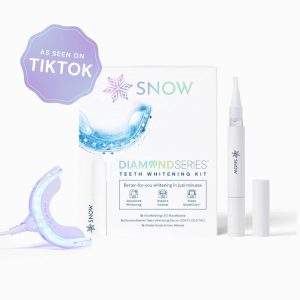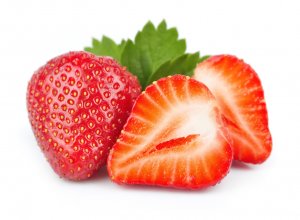Having a beautiful smile is something that many people dream of. Now, thanks to the availability of professional whitening and at-home teeth whitening kits, that dream is fast becoming a reality. But just how safe are these kits to use? And what should you look out for when deciding to whiten your teeth yourself? There are many dental myths out there so it is imperative to know your stuff beforehand.
Here is a quick breakdown of 6 of the most common misconceptions when it comes to getting whiter teeth.

- 97% saw real results after a SINGLE USE
- 100% saw results after their full treatment
- No sensitivity
- 30-day money-back guarantee
- 75+ treatments per box!
In This Article
- 1 1. ‘Professional whitening gels and at-home whitening gels are the same.’
- 2 2. ‘Strawberries, lemons and baking soda can all be used to whiten your teeth.’
- 3 3. ‘Teeth can be whitened by using whitening toothpaste and whitening gum.’
- 4 4. ‘Crowns and veneers can be whitened as well.’
- 5 5. ‘Teeth stay white forever after being whitened once.’
- 6 6. ‘Any dental professional can whiten teeth.’
1. ‘Professional whitening gels and at-home whitening gels are the same.’
Unfortunately, this is not true. Professional whitening gels tend to be stronger, and include a higher quantity of the active ingredient (i.e. the substance responsible for whitening the teeth). However, this is not to say that the stronger the gel, the better. In fact, while a stronger gel will speed up the whitening process, it could also lead to increased pain and sensitivity.
The whitening gels that come with teeth whitening kits can actually prove equally as effective with lower active ingredient concentrations, and be safer than stronger variants.
2. ‘Strawberries, lemons and baking soda can all be used to whiten your teeth.’

While it is true that strawberries and lemons can be used to whiten teeth, tread very carefully. These fruits contain acids that eat away at teeth enamel. This not only increases the likelihood of tooth decay, but also risks permanent damage to your teeth.
You’ve probably heard baking soda mentioned as another natural whitening product. Although it’s true that baking soda is effective at removing surface stains, it won’t do anything to lighten the inner colour of your teeth. In fact, you could do more harm than good in the long run since it might disrupt the balance of good/bad bacteria in your mouth and excessive scrubbing can damage your tooth enamel.
Many people swear by using charcoal to whiten teeth, and you might have noticed more and more charcoal toothpastes appearing on the shelves. Again, it carries some risk of abrasiveness if used the wrong way.
3. ‘Teeth can be whitened by using whitening toothpaste and whitening gum.’
Whitening gums and toothpastes are widely available but, unfortunately, they are unlikely to give you that Hollywood smile either. While it is true that they do contain whitening chemicals within them, the concentration will be much too low to have an effect.
4. ‘Crowns and veneers can be whitened as well.’
Whitening gels are designed for use on natural teeth only. They work by oxidising the stains on your teeth, penetrating the tooth enamel to lift and remove intrinsic stains in the “pores” of tooth enamel.
Crowns and veneers, on the other hand, are made of porcelain, so this oxidising mechanism does not work. As such, crowns and veneers would need to be replaced in order to colour-match any newly whitened set of teeth.
5. ‘Teeth stay white forever after being whitened once.’
While it is true that the colour change remains permanent, the teeth’s ageing process continues, meaning that teeth darken and yellow again over time. Regular touch-ups are therefore required in order to maintain the level of whiteness, explaining why whitening teeth professionally, using customised moulds, is the most highly recommended method.
6. ‘Any dental professional can whiten teeth.’
This is not true. According to the British Dental Association, only trained dental professionals are allowed to whiten teeth. It is, in fact, illegal for anyone other than dentists or their teams to carry out dental whitening. This is because beauticians, hairdressers, and salon staff may not have been given the proper training, and could potentially permanently damage teeth and gums with malpractice.
Dentists are trained to know which whitening products are right to use for you and your teeth. This is because whitening gels contain a strong bleach (i.e. carbamide peroxide or hydrogen peroxide) within them. Only your dentist will be able to measure and decide the correct dosage required for each individual’s set of teeth.
Your smile is often the first thing that somebody will notice about you. Make sure that you keep it full and healthy by doing your research, and by consulting your dentist before using any ‘do-it-yourself’ whitening options.




